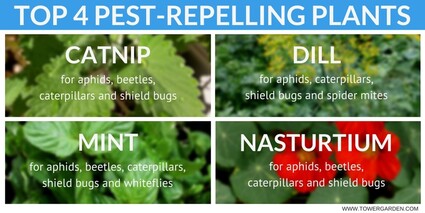Time for Garden Pest Management
Last updated 3/21/2023 at 5:38pm
Let me begin by providing each of you with a warm, gracious, and most sincere ‘thank you’ as many of you attended the Orange County Master Gardener Associations Annual Spring Plant Sale held on Saturday March 18th at Jewel Cormier Park in Orangefield. We truly appreciate our entire SETX community for braving the cold temperatures and supporting our organization. I hope each of you enjoyed the bountiful plant selections we provided for you and that the plants each of you purchased thrive! If you were not able attend our event, perhaps next year or perhaps visit us during 'Art in the Park’, April 1st from 9am until 2pm, 7th St. Orange, TX.
Gardeners, speaking of braving cold weather, it seems Mother nature simply couldn’t resist and decided she had to provide us with one last ‘taste’ of wintery-like weather before beginning her eight-month sabbatical! Well, let it be known that this gardener says, ‘good riddance’ and she will not be missed while on her extended time away, though by early September, you might hear me cast a kind word or two in her direction, wishing for ‘slightly’ cooler weather.
Many of you have already begun creating your personal paradise by planting trees, shrubs, annual and perennial flowers. Some gardeners have also planted vegetable gardens either in the ground, raised beds or containers. Growing tomatoes, peppers and other vegetables can be rewarding, especially once the harvesting of fruits and vegetables begins. Once our plant selections are planted, we need to immediately shift our attention to garden pest management before they get the upper hand are out of control.
There are numerous ways to repel the pests, the insects which invade our flower and vegetable gardens. There are numerous methods available to help us manage pests in our gardens: chemical, organic, and biological, though we must note if choosing a chemical method, there is increased risk of contaminating our fruit and vegetables during their growth process.
Before attempting to use a chemical method, gardeners must determine which insect is creating the problem, since all chemicals are not equal, and do not work on every pest. It is also imperative for each of us to read the pesticides’ label and direction for use, to ensure the insect to be controlled is listed. Improperly used pesticides are hazardous: toxic to humans, pets, and the environment! Care must be taken to use pesticides successfully by following label direction for use exactly as directed. This means adding more pesticide than required or increasing the amount will not provide better control and does much more harm good. The haphazard use of pesticides has been documented and known to be harmful to bees which are necessary for fruit and vegetable pollination and needed for ornamentals as well. The best time to apply pesticides is early evening, as bees have completed their daily foraging journeys. Let’s do our part to protect bees, pollinators, and numerous other beneficial insects.
Rather than beginning with chemical method of control, this gardener chooses less aggressive biological strategies for pest management, as they are more eco-friendly. Let’s face it folks, some people are mosquito magnets! The moment they walk outside, a relentless attack begins, and I find this to be comical (I don’t know why I find this funny), there are natural ways to combat mosquitos, gnats, flies, and several other pesky flying insects, through the use essential oils instead of harsh smelling, sticky lotions, and chemical sprays. Essential oils are natural bug repellents, and many insects avoid them.
Companion planting or interplanting odiferous herbs may assist gardeners. Each year, this gardener densely sows basil seed as a companion plant between rows of crops of squash, tomato, pepper, cucumber, pak choi, tatsoi, and throughout flower beds which has a positive impact diminishing or even eradicating detrimental insects (see the chart) while aiding beneficial insects and pollinators, since basil is a prolific bloomer!
Herbs:
Insects repelled:
Lemon grass, Lemon thyme, Lemon balm, Mint, Rosemary, Basil
House fly, mosquito
Basil, Oregano, Chamomile, Basil
House fly, mosquito, carrot fly, white fly, asparagus beetle
Chives, Dill, Catnip, Garlic, Nasturtium, Basil
Ants, aphids, beetles, squash bugs, carrot fly
Thyme, Basil
White Fly, tomato horn worm, cabbage loppers
Parsley
Asparagus beetles
Naturally, there are gardeners which would rather use a spray instead of planting herbs, and there are numerous organic products available which are safe to use. Neem oil and horticultural soap are two which I have used in my vegetable garden and flowers beds from time to time, and both work very well at controlling ‘soft bodied’ insects such as aphids, white flies, thrips, mealy bugs, and mites, at least for a short while until it rains and each have minimal effect on beneficial insects.
Another method is biological pest control where beneficial insects are purchased and released into the garden area (I have personal experience using soldier fly larvae in my barns), but understand once they have destroyed the pests, they will no longer remain. There are numerous beneficial insects for the different pests and choosing this method of insect control quickly becomes cost prohibitive with results taking longer or are non-existent.
So long for now fellow gardeners, let’s go out and grow ourselves a greener, more sustainable world, one plant at a time! To have gardening questions answered in detail contact me by email to: [email protected]. Or reach out to Orange County Master Gardeners Helpline: (409) 882-7010, visit our visit website: https://txmg.org/orange, Facebook: Orange County Texas Master Gardeners Association or by email to: [email protected].















Reader Comments(0)